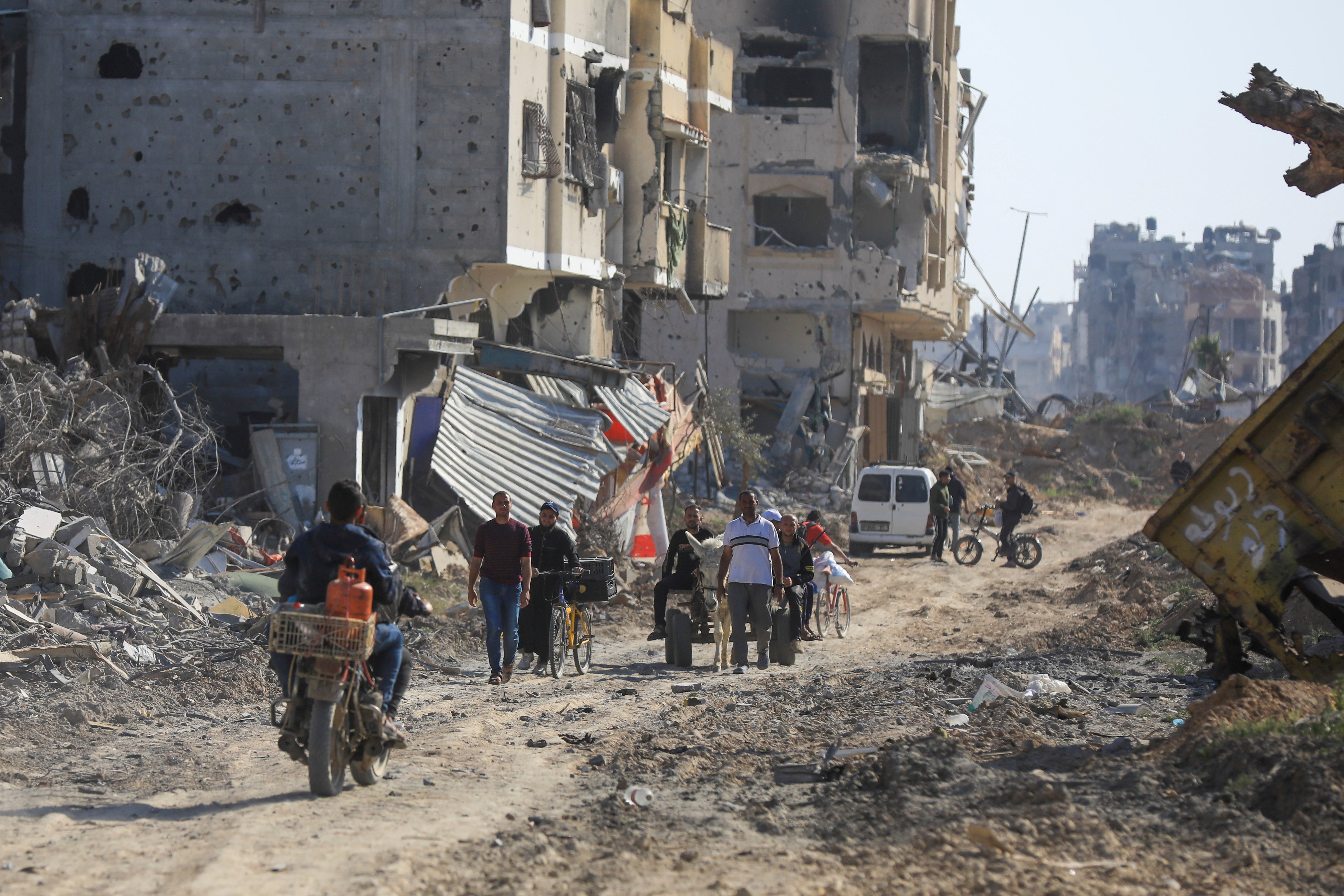Palestinians returning to Gaza city after Israeli withdrawal find area ‘unfit for life’
Israel’s withdrawal of troops from Khan Younis signaled the end of a key phase in its war against Hamas

Palestinians filed into the southern Gaza city of Khan Younis on Monday to salvage what they could from the destruction left in the wake of Israel’s offensive, a day after the Israeli military announced it was withdrawing troops from the area.
Many came back to the Gaza Strip’s second-largest city to find their former hometown unrecognizable. With scores of buildings destroyed or damaged, piles of rubble now sit where apartments and businesses once did. Streets have been bulldozed. Schools and hospitals were damaged by the fighting.
Israel sent troops to Khan Younis in December, part of its blistering ground offensive that came in response to a Hamas-led attack on Oct. 7 into southern Israel. Israeli authorities say 1,200 people, mostly civilians, were killed and roughly 250 people taken hostage.
The war, now in its seventh month, has killed more than 33,000 Palestinians, mostly women and children, according to local health authorities, displaced most of the territory’s 2.3 million people and left vast swaths of the beleaguered Gaza Strip uninhabitable.
“Many areas, especially the city center, have become unfit for life,” said Mahmoud Abdel-Ghani, who fled Khan Younis in December when Israel began its ground invasion of the city. “I found that my house and my neighbors’ houses turned to rubble.”
Israel’s withdrawal of troops from Khan Younis signaled the end of a key phase in its war against Hamas and brought Israeli troop levels in the tiny coastal enclave to one of the lowest since the war began.
Israel said the city was a major Hamas stronghold and says its operation over the past few months killed thousands of militants and inflicted heavy damage to a vast network of tunnels used by Hamas to move weapons and fighters. It also claimed to have found evidence that hostages were held in the city.
With no military presence in the city, Hamas could seek to regroup there as it has in other areas where the military has scaled back forces.
The latest Israeli withdrawal also cleared the way for some Palestinians to make their way back to the area to comb through the mountains of debris to try to hold on to any possessions that remained.
Najwa Ayyash, who also was displaced from Khan Younis, said she was unable to reach her family’s third floor apartment because the stairs were gone. Her brother climbed his way up through the destruction and pulled down some possessions, including lighter clothes for her children.
Bassel Abu Nasser, a Khan Younis resident who fled after an airstrike hit his home in January, said much of the city turned into rubble.
“There is no sense of life there,” the 37-year-old father of two children said. “They left nothing there.”
On Sunday, shortly after the military announced it had withdrawn, lines of Palestinians could be seeing leaving Khan Younis with scant possessions.
By foot and on bicycle, they carried plastic bags and laundry hampers with whatever they could gather back to where they were displaced to. One carried a rolled-up mattress. Another a standing fan. One man used his bike to move plywood.
The military exodus from Khan Younis comes ahead of an expected Israeli offensive in Rafah, Gaza’ southernmost city where hundreds of thousands have fled fighting elsewhere to seek shelter and which Israel says is Hamas' last major stronghold.
The city shelters some 1.4 million people — more than half of Gaza’s population. The prospect of an offensive has raised global alarm, including from Israel’s top ally, the U.S., which has demanded to see a credible plan to protect civilians.
Allowing people to return to nearby Khan Younis could relieve some pressure on Rafah, but many have no homes to return to. The city also is likely filled with dangerous unexploded bombs left by the fighting.
Israel’s military quietly drew down troops in devastated northern Gaza earlier in the war. But it has continued to carry out airstrikes and raids in areas where it says Hamas regrouped, including Gaza’s largest hospital, Shifa, leaving what the head of the World Health Organization called “an empty shell.” Israel blames Hamas for the damage, saying it fights from within civilian areas.
Khan Younis’ main Nasser Hospital has also been that target of Israeli raids, with troops storming it earlier this year because the military said the remains of hostages were inside.
The precise state of the hospital after the troops’ withdrawal was unclear. Video from the hospital showed the emergency building appearing to be intact, but debris was strewn around its interior where thousands of displaced people once sought shelter before being forced to evacuate by the military.
Israel says its war aims to destroy Hamas’ military and governing capabilities and return the roughly 130 remaining hostages, a quarter of whom Israel says are dead. Negotiations brokered by Qatar, Egypt and the U.S. meant to bring about a cease-fire in exchange for the release of hostages are underway.
Subscribe to Independent Premium to bookmark this article
Want to bookmark your favourite articles and stories to read or reference later? Start your Independent Premium subscription today.
